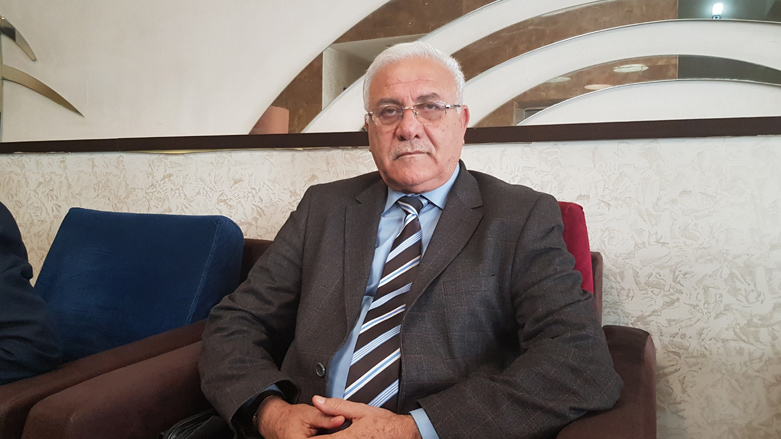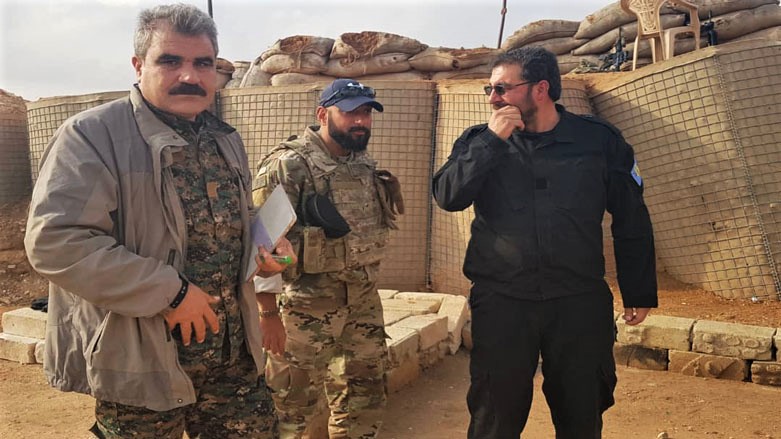Syrian Kurdish opposition leader says Turkey cannot attack Kurds without US approval

ERBIL (Kurdistan 24) – A top Kurdish member of the Syrian opposition who met Washington’s Syria Envoy, James Jeffrey, during a meeting in Ankara on October 16 told Kurdistan 24 in an exclusive interview that it is unlikely Turkey would invade the northeast of Syria as it did in Afrin because of US pressure.
“Turkey without US permission cannot intervene,” argued Fuad Aliko, member of the political committee of the National Coalition of Syrian Revolution and Opposition Forces (Etilaf), and a member of the Kurdish National Council (KNC), rival to the Democratic Union Party (PYD). While speaking to Kurdistan 24 on Wednesday, Aliko noted that Turkey “would not be able” to repeat the “Afrin scenario” in the east of the Euphrates, “unless it receives permission from the US.”
The Kurdish official said it was unlikely US armed forces would leave the northeast of Syria “any time soon” due to the presence of Iranian forces in the region and the fact that the so-called Islamic State (IS) presence in the war-torn country “would not easily be defeated.
US POLICY ON SYRIA
According to Aliko, the US is now following a new policy comprised of four points: “They will not leave Syria until Daesh [Arab acronym for IS] is defeated; Iran has departed Syria; work toward a political solution is being done,” and stated the argument that the US “would not help Syria with reconstruction unless there is a new administration [without Assad].”
Therefore, he argued, it is “unlikely” the US would soon leave Syria.
“It is difficult to see the end of Daesh [IS]. Daesh will not disappear in one or two days or even a couple of years. It will take years, just like in Iraq. In Iraq, you had Daesh from 2005 until now, the same will happen in Syria, and the US will remain in Syria for a long time,” Aliko asserted.
The Kurdish official stressed it was also unlikely that Iran would leave Syria, which will prolong the stay of US troops in the country. Indeed, US officials have said US troops would not depart the northeast of Syria until Iran-backed militias were no longer present.
“Iran has a lot of influence in Syria and will not easily give that up. Tehran has a policy of taking the fight outside of its borders, in countries like Syria, Iraq, Yemen, and Lebanon.”
“If the US does not reach an agreement with Russia and Iran, there will be no political solution to Syria. (...) It is good for the US to stay in Syria because Russia supports the regime and the US supports the opposition. Otherwise, Russia would impose its will all over the country.”
TURKEY WILL NOT ATTACK NORTHEASTERN SYRIA
According to Aliko, the “PYD [Democratic Union Party] is still needed [in the fight] against Daesh,” but Turkey also represents an important ally to the US, who “wants to prevent [Ankara] from getting close to Iran and Russia.”
“The US is now trying to make a balance between the two allies,” Aliko suggested.
The main Turkish threat is not directed at Kobani, he argued, despite recent Turkish cross-border shelling near Kobani, Manbij, and Tal Abyad.
“The fear is not for Kobani, but rather the border between Tal Abyad and Serikaniye, where the main ethnic group is Arab and displeased with the PYD. It is possible the US could allow Turkey to take over this area, but at the same time, the US does not want the PYD to be upset.”
The opposition official pointed out the US wants to separate the PYD from the Kurdistan Workers Party (PKK). The PYD, and its military arm, the People’s Protection Units (YPG), state they are not part of the PKK, something Ankara uses to justify its incursions into the Kurdish-held areas.
“At the same time,” Aliko explained, “the US labeled three senior PKK leaders as terrorists. There is no doubt the PYD is not happy about this decision, and it is clear the US wants to demark or dismantle relations between the PYD and the PKK, but we don’t know to what extent they will be successful.”
In spite of that, the US is warning Turkey that the PYD is a Syrian entity, and as such, must be included in any political solution to Syria.
“The US is telling Turkey that the PYD is part of the Syrian people’s representation, and asks them ‘where they should go?’ The Iranian and Turkish members [of the YPG or PYD] can be taken out, but the rest are Syrian, and they should be included in the political solution and part of the constitutional committee. They can be involved in the general compromise,” Aliko added.
However, he cautioned the US is serious about the “PYD cutting its links to the PKK.”
“The PKK is listed as a terrorist group by the US. But it is difficult to convince Turkey that they are separate [the PYD and the PKK]. It is also difficult for the PYD to distance itself from the PKK. So in the next phase, many things should become clear,” he suggested.
US AND TURKISH DISCUSSIONS CONTINUE
Aliko confirmed that discussions between Ankara and Washington would continue as joint US-Turkish patrols near Manbij began on November 1.
“The US and Turkey are now talking about Manbij and the east of the Euphrates, but the US has not ruled on anything yet. (…) We are concerned that, under the table, they [the US] may accept Turkey to enter. The areas with an Arab population are upset with the PYD, and the US knows it,” the Kurdish official continued.
Aliko underlined that Turkey was not interested in Kurdish majority areas, such as Kobani or the Cizere areas [in Hasakah province], but “areas where Arabs are the majority.”
“There is nothing clear regarding the Manbij roadmap, or the decision to put PKK leaders on the terrorist list,” he stated, adding that Turkey was also “using another card:” not supporting sanctions against Iran.
“In the end, the US will not give up its interests with Turkey for the PYD. Turkey, on the other hand, is attempting to unite factions from Deir al-Zor and Raqqa into one body and will discuss with the US how to allow those groups to exist in US [controlled] areas,” Aliko alleged. “They are trying to tell the US that those people are originally from those areas.”
KNC DID NOT SUPPORT TURKISH ATTACK ON AFRIN
The official denied allegations by the PYD that the KNC supported the Turkish attack on Afrin in January. Until now, the KNC is part of the Syrian opposition bloc that supports Turkey, and for some, Turkey’s incursion into the northwest of Syria.
Indeed, since March 2018, Turkey and its Islamist proxies control the Afrin region, and on March 20, the Syrian Coalition congratulated Turkey. President Recep Tayyip Erdogan on Oct. 2 even visited Afrin.
“The KNC does not have any kind of military forces that supported Turkey in the operation in Afrin. Rather, our statements were all against Turkey [and its attack on Afrin],” Aliko stressed, claiming the KNC statements were stronger than the PYD ones.
“The PYD is trying to justify its defeat in Afrin by blaming us. As you know, Afrin was sold by Russia in some deal, and until now, we had no contact with the Civil Council in Afrin,” he asserted.
Aliko noted the KNC is not part of the Turkish-established councils in the region.
“For this reason, Turkey is upset with us. Ankara has asked us to be part of the Afrin’s committees to manage [the Kurdish canton]. I was initially part of it, but I withdrew,” from the political post, Aliko emphasized.
“The management of Afrin was supposed to be given to the [opposition] coalition, but we saw Turkey was not ready to hand over Afrin’s management to the [Syrian] coalition, and our role was reduced to just selecting municipality officials.”
“That’s why the coalition has no power or authority [in Afrin], and the KNC has not provided any support for the administrations until now,” he added.
However, according to Aliko, 115 Kurds nevertheless joined the Turkish-backed councils.
“Most of those people are friends of the KNC. When the PYD was driven out of Afrin, only friends of the KNC stayed, but they have no decision-making powers.”
REBELS LOOTING AFRIN
Kurds in the local Afrin governing body were not able to stop rebel factions from looting and carrying out kidnappings in Afrin, Aliko lamented.
“The Arab factions that entered Afrin were aiming to loot it. They have looted a lot of civilian properties, machines, cars, as well as provoke people, asking for ransom money. At the same time, local municipal bodies were not able to do anything to put a stop to it,” he explained.
Aliko also argued Turkey failed to pressure the groups in question and prevent violations, adding that the KNC foreign committee met with Turkey three to four times on the matter, with little to no success.
“They [KNC] on multiple occasions demanded Turkish authorities intervene to prevent these criminal acts, but had excuses every time, claiming the area was too large to control, some 3,000 to 4,000 square kilometers, adding they did not have enough soldiers. A lot of bad things happened,” Aliko said.
The official also warned that rebel groups conduct arrest campaigns every time the YPG carry out military operations in Afrin. “When this happens, those military factions go into villages and arrest people.”
However, he noted the situation was now slightly improving since the establishment of a local military police. “Incidents have decreased some 50 percent, although cases of looting are still prevalent,” he alleged.
Although the KNC was opposed to Turkey’s Afrin attack, Aliko indicated the Kurdish opposition group would not withdraw from the Syrian opposition coalition.
“The PYD does not know how to create partnerships. Even if we left the coalition, nothing would change.”
He did, however, concede that if the PYD was willing to make concessions and form agreements of a political and military nature, the KNC would consider a compromise.
“If we reach an agreement [with the PYD], we can discuss leaving the coalition,” he affirmed, but suggested that, until now, “it is not in the interests of the Kurds to leave the coalition since there is no alternative.”
ROJ PESHMERGA UNLIKELY TO RETURN TO SYRIA
Aliko also confirmed that Rojava Peshmerga [Roj Peshmerga], a brigade of about 5,000 Syrian Kurdish fighters who played a role in the fight against IS and fought off Iraqi forces in October 2017, would not return to Syria “any time soon.”
The official said it may be possible to send the Roj Peshmerga to protect the Syrian-Turkish border, in order to prevent Turkey from shelling the border. Turkey has shelled the border on the pretext of a YPG presence.
“But this would require an agreement between the US, Turkey, and Kurdistan,” he argued. In this case, the Roj force would help protect the border, “but so far, there are no talks on this.”
Aliko expressed it would be the “best solution,” according to him, suggesting it would satisfy the PYD, the US, Turkey, and normalize relations between the KNC and the PYD. “The Peshmerga could be on the border, and the PYD could focus the YPG’s fight in areas in Raqqa and Deir al-Zor,” he concluded.
Editing by Nadia Riva

